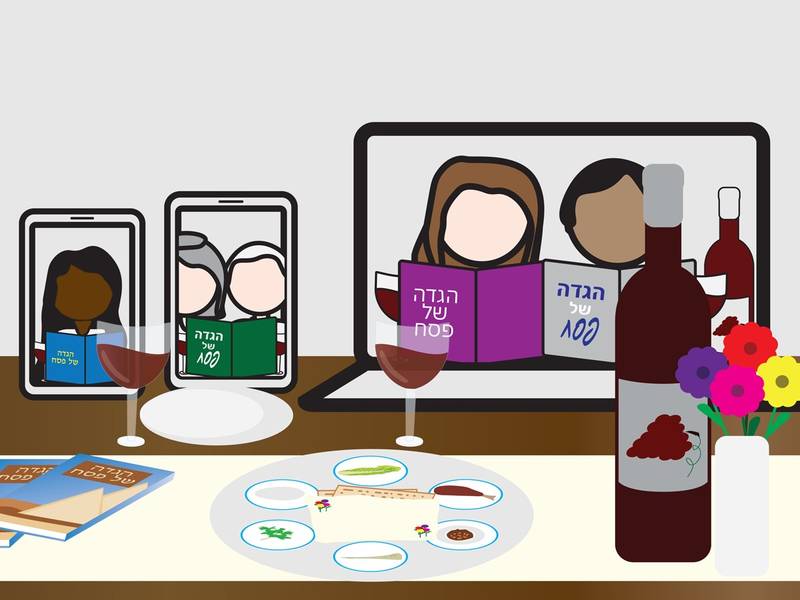Pesach (Passover)

The 5783/2023 Community Seder Was a Huge Success!
It was wonderful to see so many of you at the Seder this year. For many people, it was their first time back in the synagogue after such a long time. Thank you to all who attended.
This year's game was for each table who participates, to tell the story of the Exodus in haiku form. What fun we all had laughing and enjoying our creativity. The kids loved the afikkomen hunt and the Rabbi was able to retrieve the afikomen and complete the Seder. Good job, kids!
Special thanks to our many volunteers without whom this would not have been possible.
Next Year in Jerusalem!
Why is this night different from all other nights?
Passover (Pesach in Hebrew) is the celebration of the Exodus from Egypt. It lasts for seven or eight days depending upon tradition, but the highlight of Passover is the Passover seder, the most widely observed Jewish holiday.
The Passover seder takes place on the first night of Passover, the 15th of Nisan. It is a meal structured around the retelling of the journey from slavery to freedom, with stories, rituals, symbolic foods, prayers, songs, and lots of wine (or grape juice). All of the steps are laid out in a special book called a Haggadah, and ideally, everyone at the meal has a copy. Participation in the seder allows everyone to symbolically relive the Exodus story.
The retelling of the Exodus story is not only commanded, it is an important way of passing on Jewish identity to the next generation. It also reminds us that though we were freed from slavery we should never take that freedom for granted nor forget that others still suffer under slavery.
This is the Haggadah CBS has used in the past during online community Seders.
You are more than welcome to use it for your Seder.

Glossary
פֶּסַח Passover: “Passover;" a major Jewish spring festival that commemorates the Israelites Exodus from Eqypt more than 3,000 years ago.
סֵדֶר Seder: "Order;" ritual dinner that includes the retelling of the story of the Israelite's Exodus from Egypt; plural: sederim.
חָמֵץ Chametz: Foods not eaten during Passover. Chametz typically includes leavened bread or any food that contains wheat, rye, barley, oats, or spelt, unless production has been supervised to ensure that it has not leavened.
סֵדֶר Matzah: Unleavened bread eaten during the seder that symbolizes the hurried departure of the Israelites from Egypt. Eating matzah is obligatory only at the seder. During the rest of Pesach, one may abstain from matzah as long as all chametz is avoided; plural: matzot
הַגָּדָה Haggadah: Literally, “telling.” This is the Jewish text that sets forth the order of the Passover seder. Plural: Haggadot.
מַגִּיד Magid: “Telling.” The section of the Pesach (Passover) Haggadah designed to tell the Passover story.
שַׁבַּת הַגָּדוֹל Shabbat HaGadol: "Great Sabbath;" the Shabbat that precedes Passover.
זְרוֹעַ Shank Bone: Item on the Passover seder plate that symbolizes the paschal sacrifice.
הָעֹמֶר (the) Omer: The 49-day period that begins on the second night of Passover and ends on Shavuot.
כּוֹס אֵלִיָּהוּ Elijah’s Cup: A special cup used during the Passover seder to symbolize Elijah, who symbolizes the coming of the Messianic age.
אַרְבַּע הָקֻשְׁיוֹת The 4 Questions: Four specific questions asked at the beginning of the Passover seder, the answers to which shape the rest of the retelling of the exodus from Egypt.
קְעָרָה שֶׁל פֶּסַח Seder Plate: A plate that holds ritual foods used throughout the Pesach (Passover) seder. Each item on a seder plate is a symbol of the Exodus story and helps participants at the seder retell the story each year.
כּוֹס מִרְיָם Miriam's cup or cup of Miriam: A contemporary item added by some to the Pesach (Passover) seder. Often placed next to Elijah’s cup, Miriam’s cup highlights the role of Miriam and women in the Exodus story. The cup is filled with water to honor and remember that Miriam’s well sustained the people of Israel in the desert after the Exodus
אֲפִיקוֹמָן Afikoman: "Dessert" (Greek); matzah is the official "dessert" of the Passover seder meal. During the seder, the children traditionally "steal" and hide the afikoman, and it must be redeemed by the seder leader.
Recipes
Just the basics
Matzo ball soup – chicken soup with 3 matzo ball recipes: https://toriavey.com/toris-kitchen/perfect-chicken-soup/
Matzo brei: Learn to make Matzo Brei, an Ashkenazi Passover breakfast dish with matzo, eggs, applesauce and sour cream. https://toriavey.com/?s=matzah
Join the great debate: Floater or sinker?
How to make floater-style matzo balls for Passover from scratch using a few simple ingredients. https://toriavey.com/toris-kitchen/floater-matzo-balls/
How to make sinker-style matzo balls for Passover from scratch using a few simple ingredients. https://toriavey.com/toris-kitchen/sinker-matzo-balls/

Links and More Fun
Read the full story here: https://reformjudaism.org/passover-story
What to expect at a Passover Seder:
https://reformjudaism.org/what-expect-passover-seder
Buy your own Haggadah:
https://www.ccarpress.org/search.asp?searchString=haggadah
A Haggadah with a bit of comedy and a bit of social justice. Jew Belong Haggadah: https://www.flipsnack.com/jewbelong/jewbelonghaggadah/full-view.html
לשנה הבאה בירושלים
L'Shana Haba'ah B'Ye rushalayim

